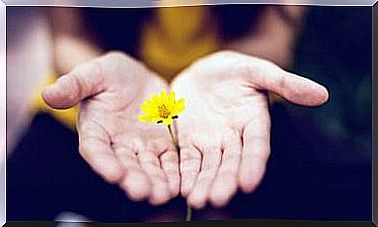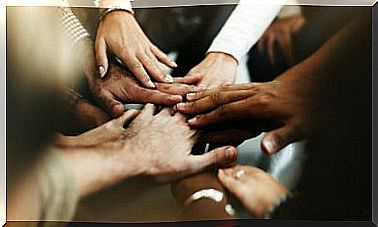Self-love, That Balm That Heals Our Wounds

How much do you love yourself? Think about it. You may not have asked yourself that question or have not even thought about it. No problem. It is more normal than you imagine. We have a bad habit of forgetting about ourselves. It is as if we do not exist, as if we are invisible to our eyes, as if taking care of ourselves is off our priority list. What’s more, I dare say that self-love does not have a place in it.
How do you treat yourself? Have you ever stopped to reflect on it? The way we speak to each other, the conception we have about who we are and, ultimately, how we value ourselves influences how we feel. The problem is that we hardly think about it.
We tend to live on tiptoe, above, without delving too deeply into how what happens around us affects us. It is as if we do not attach importance to our personal well-being. The point is that, with the passage of time, the weight of the day to day increases and, if we neglect ourselves, we can find ourselves enveloped in a gray haze that, little by little, torments us.
Living disconnected from our interior has its consequences, even if we are not aware of it. We can see it in the protagonist of the short that appears at the end of the article. Now, what can we do to free ourselves from the cobweb of automatism? How can we prevent the labels and negative messages that we have received from continuing to grow within us? Let’s go deeper.
The weight of messages received
From a young age, we grow up receiving all kinds of messages about who we are, what we should feel and how to act. Parents, relatives, teachers, friends, life partners … they all have something to say to us, most of the time with good intentions – even if it is not always favorable or suitable for us.
From “that is impossible, put your feet on the ground” or “you are wasting time, focus on what is important” to “you will not get it” or simply, “you are too dreamer”. The point is that all the messages we receive affect us in one way or another, especially during our childhood. In fact, some of them shape our identity, and others function as mandates to abide by, and when we don’t, we feel guilty.
In some cases, that learned guilt creates the emotional wound of rejection. A very deep and painful imprint that translates into a deep feeling of self-loathing, which has as a consequence the undervaluation of oneself and a void in self-love. Thus, growing up with this wound configures a very painful reality.

The sentences of the inner critic
Feeling rejected by others and, ultimately, by oneself generates a mental trap caused by the internal critic. That voice that comes from within us and is dedicated to judging how we think, feel and act. To do this, it uses any strategy: comparisons, destructive criticisms or various disqualifications.
” I shouldn’t have said it “, “I should have acted differently “, ” nothing works out for me ” or ” I’m a disaster ” are just some examples of dialogues carried out by our internal critic. The problem is that we do not question it, quite the contrary. We have these types of messages so integrated that we give them the value of absolute truth and in fact, everything we do confirms it. Because if we do not consider ourselves valid for a job, to lead a team or to write, we will probably not even try or we will boycott ourselves to banish the slightest hope that we harbor in our minds.
The influence of social media
One of the problems that greatly increases comparisons and negative self-criticism today is social networks, since they create alternative realities that can trap us if we are not attentive. Spending hours and hours immersed in this scenario of simulated appearances and feelings can make us believe that this is the only thing that exists; the truth is that it is only a showcase, in which each person can control the image they want to give to others.
The point is that if we despise and reject ourselves, that is, if we have a negative image of ourselves, social networks will increase this perception. In fact, they are the tests – false – that will confirm to us how boring our life is, how little fun we are and how lonely we are.
It is not easy to follow the rhythm of life that other people show on social networks. A study from the University of Pittsburgh, Pennsylvania (USA), affirms that consulting social networks too frequently generates envy and the distorted belief that others have a much more original, happy and interesting life.
As we can see, we are experts in mistreating ourselves, but above all in comparing our lives with those of others, without realizing that it is absurd. Why waste time comparing whether people’s conditions, characteristics, perspectives and experiences are different from each other?
The protagonist of the short Overcomer is an example of how social networks can be a double-edged sword; Above all, if there are wounds from the past that have not been healed, since the person who bears the weight of a wound usually filters reality through it. Your mind often operates on cognitive distortions (wrong ways of processing information or misinterpretations), such as selective abstraction, personalization, labeling or emotional reasoning and social networks promote these types of mechanisms.

Self-love: the reunion with oneself
What to do to stop the inner critic? How to rebuild our broken parts? Is it possible to stop the mental maze that traps us in self-loathing? It seems that the protagonist of our short finally discovers the secret ingredient: self-love.
Now, it is not easy to reconcile with yourself, and much less when most of the time the treatment has been negative. They are many years training in criticism, the demand, the disqualification so that, suddenly, almost by magic we begin to love each other. It takes a lot of patience, effort, acceptance and, of course, commitment to yourself.
Embracing our broken parts often involves suffering at first, but also a lot of courage and the ability to forgive and forgive ourselves. Being able to give each other love when it is what we need the most – and we did not know it – requires a lot of strength and a lot of effort. For this reason, there are a number of aspects that we must take into account:
- Consider ourselves valuable. We are much more than our mistakes and failures, much more than our results. We are limited edition and that nobody can steal it from us. We may have grown up without realizing it and that even now it is hard to believe it, but it is never too late to look in the mirror and begin to see the full potential we have.
- Practice self-compassion. Addressing and accepting our mistakes and limitations with respect is essential to move forward. Knowing that being confused is an opportunity to learn and that judging ourselves is a habit that does not help us changes our perspective. In fact, according to an article in the journal Personality and Social Psychology, self-compassion makes it easier to achieve personal fulfillment.
- Forgive. Forgiveness is a liberating act from the bonds of the past. Forgiving is an opportunity to heal our resentment, the one that at some point hurt us so much. Now, we must not only forgive others, but also ourselves for the treatment we gave ourselves.
- Live with intention. Being mindful of the present moment is a way to let go of the past and avoid being overwhelmed by the future with its worries. Living on a day-to-day basis, savoring what happens at every moment, committed to taking care of ourselves and serving us is a protection mechanism.
- Disconnect to connect. Despite being in the era of digital connection, it is advisable to disconnect from that intangible world to connect with the one that is revealed before our eyes and, of course, with the people around us. In this way, we will prevent the theater of appearances from dominating our lives.
As we can see, self-love is built little by little, it is delicately woven and watered every day. It is that light that we all carry inside, but that, sometimes, it is so hard for us to charge it with intensity. Loving us is the support for our well-being, the hug that shelters us and the balm that heals our wounds.
Finally, we leave you with this wonderful short.









